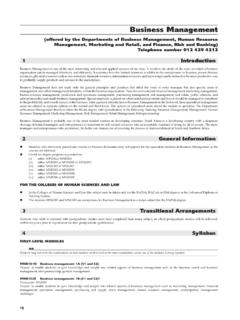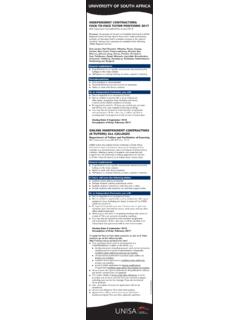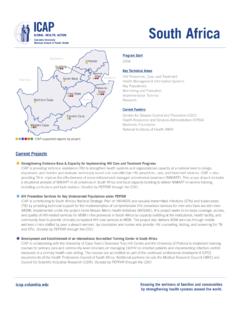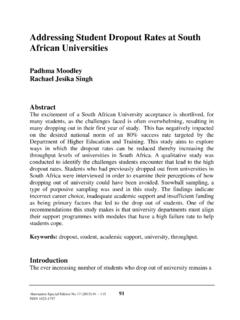Transcription of 2008 University of South Africa - Lisa for Student …
1 # 2008 University of South AfricaAll rights reservedPrinted and published by theUniversity of South AfricaMuckleneuk, PretoriaIOP203S/1/2009 2011982978213B2 IOP308-StyleContentsContentsAbout this moduleviPART IORIENTATION TO FORENSIC PSYCHOLOGYSTUDY UNIT 1: INTRODUCTION TO role of the psychologist in the forensic categories in UNIT 2: THE FORENSIC is the law? distinction between civil and criminal of the law (court decisions) of the court and forensic and/or expert courtroom and the of fact or expert to keep in mind when IITHE PRACTICE OF FORENSIC PSYCHOLOGYSTUDY UNIT 3: FORENSIC purpose of of status report UNIT 4: PRACTISING ETHICAL FORENSIC forensic forensic UNIT 5: FORENSIC PSYCHOLOGY IN CRIMINAL legal concepts in the criminal in a criminal role of the forensic psychologist in criminal to stand criminal criminal criminal criminal of UNIT 6: PERSONAL INJURY testing of role of the educational psychologist in assessing a childwith a head psychological UNIT 7: ASSESSMENT FOR COMPETENCY.
2 CUSTODYAND acts important in child custody/access types of custody and for determining process of of families in custody parenting considerations in the evaluation of custody of a UNIT 8: ASSESSMENT FOR of the industrial of the industrial IIIKEY CONSIDERATIONS IN FORENSIC PSYCHOLOGYSTUDY UNIT 9: HUMAN DEVELOPMENT AND child development and different , risk and protective UNIT 10: UNDERSTANDING THE PHYSIOLOGICALFUNCTIONING OF THE spinal cord and its UNIT 11: PERSONNEL human Job Performance Performance Appraisal Determining this moduleAbout this moduleWelcome to this learning experience in Forensic Industrial Psychology(IOP203S). We trust that you will find the module interesting, meaningful andpersonally enriching, and that it will be of practical value to you in your personallife and work situation.
3 Please note that although the module is called ForensicIndustrial Psychology, the content in fact covers the field of forensic avoid confusion, reference is made in the text to forensic psychology only,and forensic industrial psychology is discussed as a STUDY FORENSIC PSYCHOLOGY?Forensic psychology concerns itself with the application of psychologicalknowledge to the legal field. It is a highly specialised field, which places a hugedemand on the psychologist in terms of relevant knowledge, experience and theability to communicate accurately and scientifically in a legal an expert in the field of human behaviour, the psychologist has a major roleto play in the legal context. As an expert witness, the trained forensicpsychologist can assist the court in an objective and professional manner to solvelegal cases.
4 Through a combination of expert knowledge, skill and integrity, theforensic psychologist can contribute to the efficient and optimal functioning of thelegal system in both criminal and civil OF THE FORENSIC PSYCHOLOGY MODULEThis module has a dual purpose. As lecturers, our aim is that you will be able todo the following once you have completed this module:(1) demonstrate basic competencies (knowledge, skills and value orientations)in the theory and practice of forensic psychology that will enable you tomake a positive contribution to your organisation, your team and thebroader community(2) explore forensic psychology as a potential career by providing you withopportunities to assess your mastery of desirable competencies as aforensic psychologist and to plan your personal development accordinglySpecific learning activities and assignments are provided to assist you indeveloping your personal competence in the practice of forensic suggest that you keep a personal development file to keep track of yourprogress in the specified forensic psychologist UNDERLYING THE STUDY GUIDEThis study guide was developed according to the principles first step was to create a desire to know more about this specific field oflearning.
5 We have therefore given the reasonswhyit is necessary for you tolearn about the field of forensic second step is to put the field of study into areal-life contextby means ofcase studies, with a view to affording you the opportunity to do asocial analysisof make this approach more practical, we challenge you to become involved inanalysing relevant problems and issues. These challenges are contained in theactivities and assignments that form part of the performance tasks of this the third step, a solidfoundational theoretical knowledge baseis provided tosubstantiate your analysis of the , we want you to ask yourself the question:What can I dowith what Ihave learnt in these three steps in order to better myself, others, myorganisation, my community and the environment? Finding answers to thisquestion entails continuous reflection on your last step involvesacademic assessmentandself-assessmentTheassessmen t strategyis based onfour outcomes.
6 This means that in answeringquestions, be they in the activities, the self-assessment tasks, the assignments orthe examination, you must prove that explain why (knowledge).can do something (skills).want to make a positive difference (values).want to do it well (attitude)Applied competence entails applying your knowledge, skills, values and attitudesin three ways:.foundational competence demonstrated understanding of what we aredoing and competence demonstrated ability to consider a range ofoptions/possibilities and make decisions about competence demonstrated ability to link our understanding toour performance so that we learn from our actions and are able to adapt tochanges and unforeseen circumstancesThroughout the various study units and in the tutorial letters you will encountera number of activities and assignments.
7 The purpose of these is to afford you theopportunity to apply the above competencies on all activities and assignments will also give you a good idea of what you canviiFOREWORD expect in theexamination. It should be clear that we are not only interested inthe reproduction of the given theory. We are also interested in your ability tocreate your own theory, based on the meaning that you attribute to concepts, aswell as their application in a given situation be it in a personal ororganisational PURPOSE OF ASSESSMENT IN HIGHER EDUCATIONWhat is assessment?Assessment in outcomes-based education focuses on the achievement of clearlydefined outcomes, making it possible to credit learners' achievements at everylevel, whatever pathway they may have followed and at whatever rate they mayhave acquired the necessary is the process of identifying, gathering and interpreting informationabout a learner's achievement, as measured against specified learning outcomesfor a particular learning module.
8 It involves four steps: generating and collectingevidence of achievement; evaluating this evidence against the outcomes;recording the findings of this evaluation; and using this information to assist thelearner's development and to improve learning and teaching distance education on a higher education level, the following types ofassessment are used to collect evidence of learners' achievements:(1)Formative assessmentconsists of a wide range of learner performancetasks such as assignments; case study analyses and applications; andassignments. Formative assessment is primarily the learner's lecturers provide guidance in the form of structured learning tasks asdescribed in the study guides and tutorial letters.(2)Summative assessmentis the final assessment of the learner's achievementof the specified learning outcomes.
9 In distance education on a highereducation level, the examination is the primary method of measuringwhether the learner has achieved the learning outcomes specified for thelearning short, the learning outcomes described in the study guide serve as the basisfor assessment (the examination). Learners who work through the study guideactivities and the assignments systematically, and who continually measure theirprogress against the specified learning outcomes, will be able to achieve thelearning outcomes assessed in the for your assessment (the examination)It is primarily your responsibility to demonstrate that you have achieved thelearning outcomes for this module. Your preparation for the assessment (ie theexamination) should consist of a number of steps. These are the following:.Study and analyse the learning outcomes specified for this module sure that you know what you have to demonstrate to convince theexaminer that you have achieved the outcomes of this systematically through the study guide and assignments.
10 Try to do thelearning activities, tasks and assignments provided to help you measure the lecturers immediately should you experience any difficulty withthe learning material and TO USE THE TUTORIAL MATTER IN YOUR LEARNINGPACKAGEYour learning package consists of the following items:.the study prescribed lettersThe study guideThe study guide and the textbook are your main tools for studying this study guide is divided into three main parts, each containing various studyunits. At the beginning of each study unit, the study unit is summarised by meansof a study unit chart that illustrates the learning units that make up the study the study units you will be referred to the prescribed book. The study guide isreally only a guide to the prescribed book. We have clearly indicated whichsections in the prescribed book you have to study.










